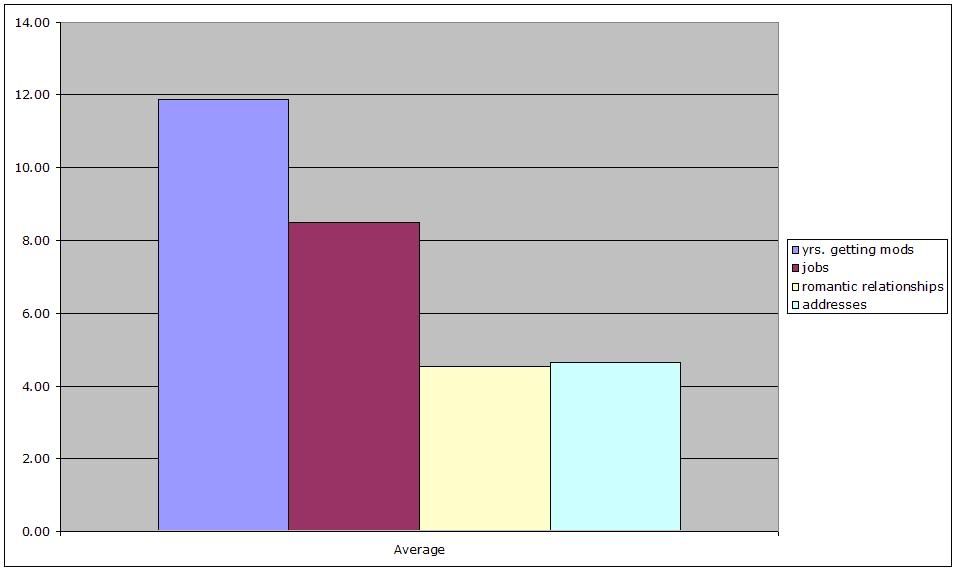| At A Glance | |
| Author | Lara |
| Contact | [email protected] |
| IAM | ta2lu |
| When | N/A |
I thought that this might be a common theme amongst my tattooed and pierced friends. So, I took an informal poll of what I believe to be a fair representation of permanently modified individuals. A young European girl with piercings. A transsexual. Visibly tattooed and not-so-visibly tattooed men and women. An extremely modified gay church deacon. A dominatrix. A secretary or two. There was indeed a commonality in their answers to my questions. My findings?

We range in age from 21 years old to 59 years young. The average number of years that we've been getting tattooed and pierced is 11 years. In those years, we've changed jobs -and oftentimes professions- every year and a half! It's interesting to note that our romantic relationships and address changes are almost identical. How many of us are moving to be with our partners?
Those are just the numbers. I've never really been much of a math girl; the subjective answers are far more remarkable to me.
When asked if their body modifications give them a sense of stability in their changing lives, the response was a mostly resounding "absolutely!" Some of the replies were poignant and personal. One example is from a young girl with both tattoos and piercings: "It is one of the very few things I can control. I used to be anorexic. This is a much healthier way to deal." Another friend comments on getting tattooed after the death of her boyfriend: "I felt closure when I added my tear to my sunshine on my back. I went in and cried to the girl who tattooed me. I went the night of the wake. Very much a moment of closure for me." Tattoos have a way of bringing solidity to those shaky times in our lives. One case in point is from a local friend who says "I find that I usually get my tattoos after I go through something emotional in my life..."
I could've written this next one myself. It echoes my feelings to a T. "My mods are a constant. No matter where I go, they go with me. I feel like the more I'm tattooed, the more my outside matches my inside." Another way of saying this? "Ink and needles set me free to be me." Or, from a dear friend from across the ocean, "it gives me a sense of me; the tattoos I have were always in, just somebody got them out with a needle."
Not everyone agrees, or places as much importance on their mods in keeping them grounded. Hrm. Decide for yourself after reading what one of my favorite people said: "I don't know if I would call it a sense of stability. It gives me a sense of taking control of my own destiny to a point. Being tattooed is a big part of who I am."
Besides moving and changing jobs and swapping romantic partners, many of us have changed lifestyles since we've been getting tattooed. I was a single 23 year-old who wore a suit to work when I got my first tattoo. By the time I was at my third tattoo, I had the same corporate job, but was now married. To a biker. You would think that this would be a time of many tattoos for me, but it wasn't. I waited until after I got divorced to go haywire at the tattoo shop. Lots of tattoos that were colorful shout-outs to my mom and dad and sister- the people who were there for me when my life was being turned upside-down. By now, I was a full-fledged biker chic on my own in the big city. I quit that silly job and started working at a towing company. The suits were consigned and I turned to living in jeans, boots and t-shirts. Spent a lot of wasted time being wasted. Trying to figure out who I was. After a few years, I realized that my play-job and the parties weren't me. The girl who kept getting tattooed, however, was. All of that beautiful skin art, and indeed the very act of getting it, brought me to where I am today. In the perfect office job, married to my favorite tattoo artist.
You could say that my lifestyle and my mods are one and the same now. My piercer friend thinks the same. "At first the body mods I thought just went with the lifestyle...But then the mods took control over the lifestyle and the "lifestyle" took to the backseat and the Body Mods became my lifestyle."
I got some really terrific responses to my "Any other thoughts?" A single mom tells me that, because she is so heavily tattooed, her children are "color-blind." She also says, "Being modified gives me a sense of security within myself even while others stare. I'm being who I am."
Other tid-bits that I enjoyed hearing were:
"Be yourself. Tattoos are the one thing you can take with you when you die, so express yourself accordingly!" And:
"We can educate by example to some extent, but it will not quickly change years of cultural and personal bias."
But, this was supposed to be about how our various body modifications provide a base for our changing lives. Fascinating, really, since "modify" is a synonym for "change." And so, perhaps, my closing words shouldn't be my words at all, but those of someone who is ever-transforming and planning to do even more so in the near future:
"Everything in this lifetime seems to be disposable... Even life has become disposable... Body modification is as permanent as the person it's on - often more so - it's something you can't throw away... can't dispose of... I think has a beauty beyond words."